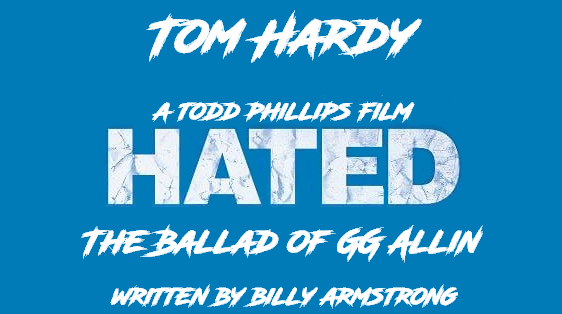Welcome to History Lesson, where we take a closer look at the movies that dare to tackle real-life events with varying levels of accuracy, drama, and WTF casting choices. These films promise to educate and entertain, but more often than not, they rewrite history with the subtlety of a sledgehammer. We’ll be your guide through the land of miscast biopics, dramatic embellishments, and historical “inspired-by” liberties, breaking down whether these flicks are Golden Reel Award-worthy masterpieces or just a big-budget Wikipedia summary. Either way, it’s more fun than your high school history class—and there’s popcorn.
This time around we will take a look at Season 5's fact-based slate....
HISTORY LESSON: Hated: The Ballad of GG Allin
In Hated: The Ballad of GG Allin, Tom Hardy fully embraces the punk icon’s filthy, feral persona with the kind of energy that screams, “What if Mad Max had diarrhea?” Directed by Todd Phillips — yes, the guy behind The Hangover — this biopic is less “inspirational journey” and more “can you believe this guy was a real person?” Hardy stomps around naked, smearing himself in bodily fluids like he’s auditioning for a particularly disturbing art installation. If nothing else, this film is a testament to Hardy’s dedication to roles no one else in Hollywood would touch with a ten-foot pole.... for hygiene reasons.
The movie dives headfirst into GG’s deranged life, starting with his father (Michael Shannon) naming him Jesus Christ and ending with a funeral where the only thing more offensive than the smell was the playlist. Phillips manages to capture the nihilistic punk vibe, though you’re never quite sure if you’re watching a deep character study or an extended dare to the audience. Between the onstage mayhem, heroin-fueled rants, and literal crap-throwing, Hated delivers a biopic so wild it makes Johnny Knoxville look like a model of restraint. It's a surprisingly accurate biopic - just don’t watch it while eating.
HISTORY LESSON: The Life of the Party
The Life of the Party dives headfirst into the glitz, glam, and downfall of silent film star Fatty Arbuckle, with Eric Stonestreet delivering a career-defining performance. Stonestreet captures Arbuckle’s charm and vulnerability, from his meteoric rise as a comedic icon to his catastrophic tumble into scandal. Spielberg recreates the infamous St. Francis Hotel party with the kind of precision that makes you wonder if he’s got a time machine. Between Lara Jean Chorostecki’s conniving Maude Delmont and the absurd courtroom drama led by Richard Dreyfuss as an opportunistic DA, it’s clear the legal system was less about facts and more about headlines. And let’s not forget Rhys Darby as Buster Keaton, loyally defending Arbuckle while trying not to trip over the film’s own melodrama.
The film’s sharpest edge comes in its critique of tabloid-fueled justice, where facts were as flexible as the comedy routines Arbuckle was famous for. Arbuckle is acquitted after three trials, but not before his career and reputation are obliterated. Spielberg gives us the bleak irony of Arbuckle’s brief comeback — he signs a new film contract, only to die of a heart attack that same night. It’s tragic, yes, but Spielberg’s penchant for over-the-top dramatics ensures you’re left both moved and vaguely annoyed at the cosmic unfairness of it all. If nothing else, this film proves Hollywood’s taste for scandal hasn’t changed a bit in a hundred years.
HISTORY LESSON: The Beatles
The Beatles offers a sprawling, time-hopping journey through the lives of the Fab Four, framed by George Harrison’s final days. Ron Howard directs with an earnestness that’s part homage, part docudrama. The cast? It’s eclectic. Daniel Radcliffe as John Lennon is surprisingly intense, while Harry Styles as Paul McCartney straddles the line between dreamy and daft. Fionn Whitehead’s George anchors the story, but Craig Roberts as Ringo seems more like a mate who wandered onto set and stuck around. The film ping-pongs from iconic moments like the Ed Sullivan Show to the rooftop concert, all the while documenting the escalating chaos that tore the band apart. And yes, Yoko’s here (Karen Fukuhara) in all her divisive glory.
The film’s biggest flaw? It tries to do everything — from Beatlemania to Maharishi-fueled spiritual crises — with the subtlety of a Beatles Greatest Hits album commercial. The pacing is as uneven as John and Paul’s friendship by 1969, with moments of genius interspersed with melodrama. Still, Liam Neeson as elder George is quietly affecting, and the final reunion between Paul, Ringo, and George provides some genuine feels. While the movie might stumble under the weight of its own ambition, it’s hard not to hum along as history’s greatest band takes one last bow.





No comments:
Post a Comment